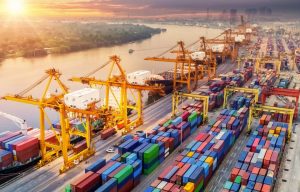
The World Trade Organizations has recently released a new report, which examines the possible impact of blockchain technology on trade finance. They aim to provide solid research and information about the widely-discussed benefits in international trades.
We have prepared for you a short outline from the main findings of the WTO.
Paperless trade
International trade includes an excessive amount of administration. According to a test from Maersk in 2014, 1 shipment from Kenya to the Netherlands included over 100 actors, 30 people, and 200 interactions. From the 34 days shipment, 10 days were due to waiting for documents. By using blockchain technology documentation could be registered significantly faster and with greater efficiency. In regards to the widely-used letters of credit, according to a test from Barclays, blockchain can reduce the time needed from 7-10 days to a few hours.
New services
The internet has opened the door to a wide array of new business models, especially in the services industry. Blockchain could extend this possibility further. The improved services can include finance, e-commerce services, and insurance as well. For example, it could be used to improve the marine insurance sector. 90% of international trade is conducted on sea routes, with multiple risks ahead from congested ports to cargo damages. The $30 billion industry which is full of inefficiencies. Maersk, IBM, and Ernst and Young have already built the first proofs-of-concept for issuing marine insurance, and significantly improved efficiencies.
Hurdles towards adoption
While blockchain has the potential for vast improvements, there are several problems which needed to be solved first. Such issues include transaction speed and energy consumption, especially in regards to public blockchains. The technology is resilient to many security attacks due to cryptography and distributed nature, there are still some potential weaknesses. The other 2 major issues now are interoperability between multiple blockchain types and the legal framework which is still developing around this new technology.
“Blockchain could make international trade smarter, but smart trade requires smart solutions and smart standardization – which can only be developed through cooperation,” the report reads. “If we succeed in creating an ecosystem conducive to the wider development of Blockchain, international trade may look radically different in 10 to 15 years.”
This article by Roxana Florea was originally published at BlockchainFlashNews.com:
